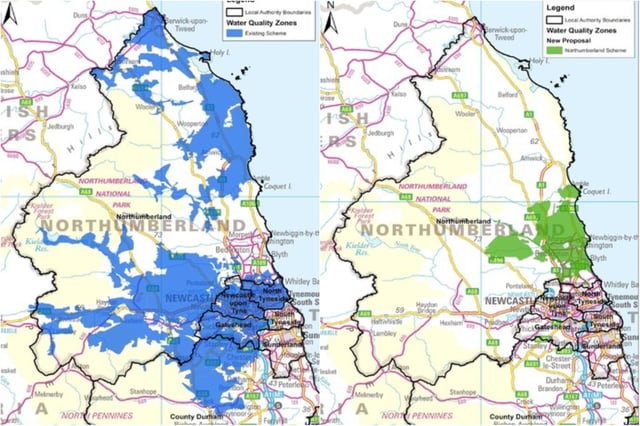'Poison' claims rubbished in clash over plans to double water fluoridation in Northumberland

Opposing views from water-fluoridation opponents and medical experts have been aired, ahead of a consultation on a proposed change in Northumberland.
By Ben O'Connell
Tuesday, 10th March 2020, 11:59 am
A map showing the areas of Northumberland covered by the existing fluoridation scheme (in blue) and one showing the areas proposed to be covered by the extension (in green). Picture from Northumberland County Council
A map showing the areas of Northumberland covered by the existing fluoridation scheme (in blue) and one showing the areas proposed to be covered by the extension (in green). Picture from Northumberland County Council Copyright: Other 3rd Party
As previously reported, the county council is proposing to vary the community fluoridation scheme as part of its oral health strategy, to more than double the number of Northumberland’s households which receive fluoridated water.
Community water fluoridation involves raising and maintaining the concentration at a level of one milligram per litre in areas where the natural levels are too low.
The current scheme covers areas in the north and west of the county, so the proposed extension would cover the south-east, from Blyth out to Bedlington and Morpeth and up the coast to Amble – an area which includes some of Northumberland’s most deprived communities.
Initial backing for the process from the Health Secretary and Northumbrian Water has already been received and an ‘active listening exercise’ has begun, ahead of a formal public consultation later this year.
At a meeting of the health and wellbeing committee on March 3, Liz Morgan, the council’s director of public health, reiterated that 70 years’ worth of scientific evidence has confirmed that fluoridated water is safe and effective, with the only medical impact between areas of non-fluoridated and fluoridated water being lower rates of dental decay.
‘Slow-acting poison’ claims
However, the meeting also heard from Joy Warren, joint coordinator of the UK Freedom from Fluoridation Alliance, which she said ‘speaks truth to power’.
She questioned why councillors would support the addition of ‘a slow-acting poison to your water supply’.
Setting out ‘three of the 50 reasons’ against water fluoridation, which she claimed was ‘universally unpopular’, she referred to it being ‘compulsory medicine’, a waste of money and that it ‘reduces human intelligence’.
But Coun Susan Dungworth said: “I’ve never sat through a presentation with so much unsourced data and general statements.
“I don’t like this chamber being used to suggest that Public Health England, NHS England and even this council are not concerned about the health of our residents.”
‘Just because you say something over and over again, it doesn’t mean it’s true’
Members also received presentations from John Morris, from the University of Birmingham’s School of Dentistry, Dr Tom Robson, who has worked as a dentist across County Durham and Northumberland, and Dr Anna Redfearn, a paediatrician in the Blyth Valley area, who is the designated doctor for Northumberland’s looked-after children.
All reinforced the position that water fluoridation works to prevent dental decay and is not harmful, with Dr Robson saying: “Just because you say something over and over again, it doesn’t mean it’s true.”
Mr Morris talked about assessing sources of information and evidence, pointing out that even individual scientific studies can be misinterpreted or misleading, particularly in how they are reported, but that water fluoridation is supported by extensive evidence reviews.
Dr Redfearn suggested that it was an equality issue, given the levels of deprivation in some of the areas that aren’t currently covered by the fluoridation scheme.
The committee’s role was not to decide whether to support or oppose the fluoridation proposal, but to discuss which issues needed to be covered or addressed as part of the public consultation.
The chairman, Coun Jeff Watson, said that the key would be getting responses from harder-to-reach groups, who are the ones mainly being targeted with this intervention.
Coun Trevor Cessford agreed, saying that the key focus appeared to be the 25% of children who don’t go to the dentist and were unlikely to be picked up by other interventions.
The capital costs of the proposed extension, for the plant and equipment, is around £2.15million, which would fall to the Department of Health and Social Care. The annual running costs would be between £85,000 and £182,000, and would be covered by the county council’s existing public health grant.
0 Comments:
Post a Comment
<< Home